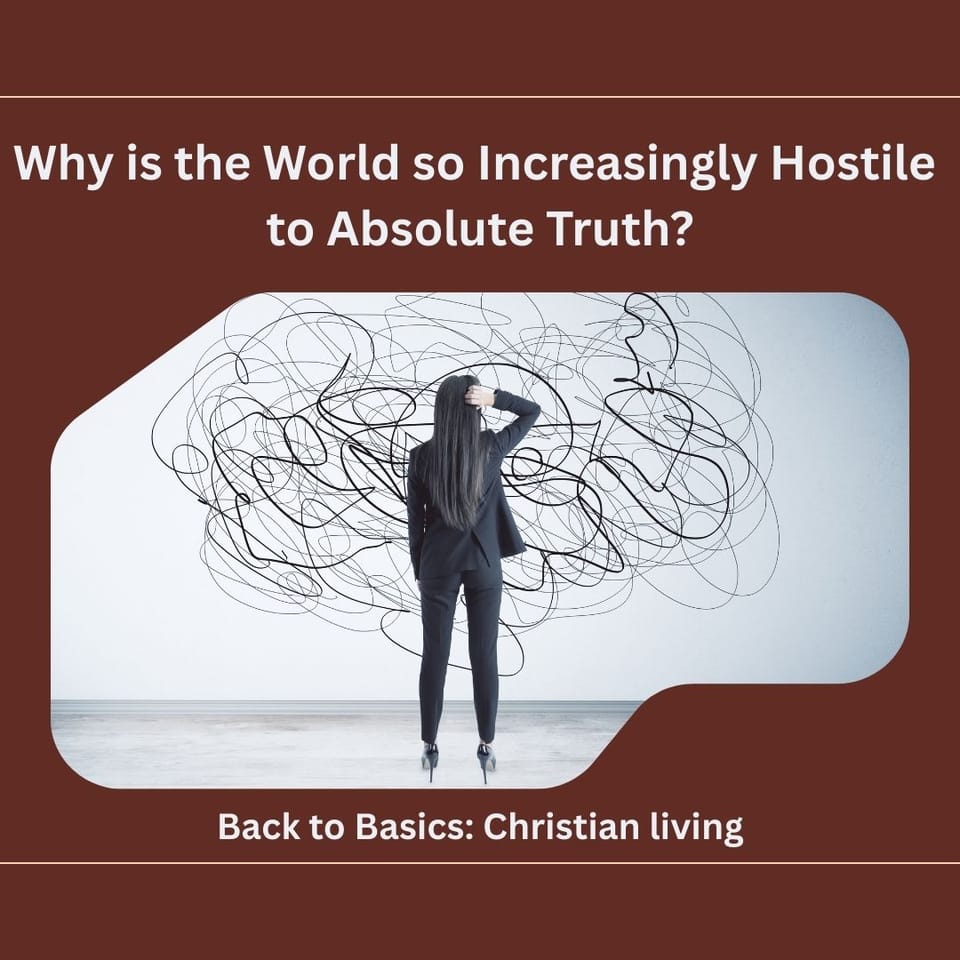Why is the World so Increasingly Hostile to Absolute Truth?

Navigating faith in a post-truth culture!
In today's rapidly changing world, it's becoming increasingly evident that society is growing more hostile toward the concept of absolute truth. As Christians who stand firmly on the unchanging foundation of God's Word, we must understand this cultural shift and equip ourselves to navigate it with wisdom, grace, and unwavering faith.
The Shifting Sands of Truth
We live in an age where relativism reigns supreme. The popular mantra has become "what's true for you may not be true for me," effectively reducing truth to mere personal preference. This stands in stark contrast to the Biblical worldview, which proclaims that truth is not subjective but absolute, grounded in the character and revelation of God Himself.
Scripture is abundantly clear: "Jesus saith unto him, I am the way, the truth, and the life: no man cometh unto the Father, but by me" (John 14:6 KJV). Here, Christ doesn't present Himself as one truth among many, but as THE truth—absolute, exclusive, and universal.
The apostle Paul warned of this very cultural moment: "For the time will come when they will not endure sound doctrine; but after their own lusts shall they heap to themselves teachers, having itching ears; And they shall turn away their ears from the truth, and shall be turned unto fables" (2 Timothy 4:3-4 KJV).
Why Is This Happening?
Several factors contribute to our society's growing hostility toward absolute truth:
1. The Elevation of Autonomy
Modern culture prizes personal autonomy above all else. The idea that there might be a truth that stands in judgment over our desires and decisions is increasingly viewed as oppressive. Yet Scripture teaches, "There is a way which seemeth right unto a man, but the end thereof are the ways of death" (Proverbs 14:12 KJV).
Our culture celebrates the individual as the ultimate arbiter of truth, while the Bible consistently points to God as truth's source and standard. "Sanctify them through thy truth: thy word is truth" (John 17:17 KJV).
2. Postmodern Influence
Postmodernism has deeply shaped our cultural landscape, teaching that truth is merely a social construct—something created rather than discovered. This philosophy directly contradicts the Biblical understanding that truth is anchored in God's unchanging character: "For I am the LORD, I change not" (Malachi 3:6 KJV).
When truth becomes malleable, morality inevitably follows suit. Without absolute truth, ethical boundaries blur, leading to the situation described in the book of Judges: "In those days there was no king in Israel: every man did that which was right in his own eyes" (Judges 21:25 KJV).
3. Fear of Exclusivity
In our pluralistic society, any claim to exclusive truth is often labelled as intolerant or even dangerous. The biblical declaration that "Neither is there salvation in any other: for there is none other name under heaven given among men, whereby we must be saved" (Acts 4:12 KJV) runs counter to our culture's insistence that all paths lead to God.
This fear of exclusivity has led many, even within the church, to water down the exclusive claims of Christ in an attempt to appear more accommodating. Yet Scripture warns, "Beware lest any man spoil you through philosophy and vain deceit, after the tradition of men, after the rudiments of the world, and not after Christ" (Colossians 2:8 KJV).
4. Digital Echo Chambers
Our digital age has allowed people to curate information environments that simply reinforce existing beliefs. When everyone in your online community agrees with you, the idea that you might be wrong becomes increasingly foreign. This creates a false sense of consensus that can harden hearts against truth.
The Bible speaks to this phenomenon: "For the time will come when they will not endure sound doctrine; but after their own lusts shall they heap to themselves teachers, having itching ears" (2 Timothy 4:3 KJV). Our digital age has made "heaping up teachers" easier than ever before.
Standing Firm in a Shifting Culture
How then should Christians respond to this cultural hostility toward absolute truth?
1. Know the Truth Deeply
We cannot stand for truth if we don't know it ourselves. Jesus said, "And ye shall know the truth, and the truth shall make you free" (John 8:32 KJV). This requires diligent study of Scripture, not merely casual reading.
"Study to shew thyself approved unto God, a workman that needeth not to be ashamed, rightly dividing the word of truth" (2 Timothy 2:15 KJV). In a world hostile to truth, superficial knowledge won't suffice.
2. Speak Truth with Grace
While we must not compromise on truth, we must communicate it with gentleness and respect. "But sanctify the Lord God in your hearts: and be ready always to give an answer to every man that asketh you a reason of the hope that is in you with meekness and fear" (1 Peter 3:15 KJV).
Our tone matters as much as our content. "Let your speech be alway with grace, seasoned with salt, that ye may know how ye ought to answer every man" (Colossians 4:6 KJV).
3. Live Truth Visibly
In a post-truth world, the most compelling argument for absolute truth is a life transformed by it. "Let your light so shine before men, that they may see your good works, and glorify your Father which is in heaven" (Matthew 5:16 KJV).
When we live according to God's truth, the contrast with the surrounding culture becomes evident. "And be not conformed to this world: but be ye transformed by the renewing of your mind, that ye may prove what is that good, and acceptable, and perfect, will of God" (Romans 12:2 KJV).
4. Pray for Spiritual Awakening
Ultimately, only the Holy Spirit can open blind eyes to see the truth. "Howbeit when he, the Spirit of truth, is come, he will guide you into all truth" (John 16:13 KJV). We must pray fervently for God to work in hearts around us.
The world's hostility toward absolute truth should not surprise us. Jesus Himself said, "If the world hate you, ye know that it hated me before it hated you" (John 15:18 KJV). Yet we stand on the unshakeable foundation of God's Word, confident that though "Heaven and earth shall pass away, but my words shall not pass away" (Matthew 24:35 KJV).
In this cultural moment, let us be people who love truth because we love the God of truth. Let us speak it boldly yet graciously, live it out consistently, and trust that the same truth that set us free can do the same for others. For we know that ultimately, truth will prevail: "And ye shall know the truth, and the truth shall make you free" (John 8:32 KJV).
Key Takeaways:
- Society is increasingly rejecting absolute truth in favour of relativism, embracing the idea that truth is subjective rather than universal.
- This hostility towards absolute truth is fuelled by modern culture's elevation of personal autonomy, postmodern influence, fear of exclusivity, and digital echo chambers.
- Christians are called to stand firm on the foundation of God's unchanging Word: "Jesus saith unto him, I am the way, the truth, and the life" (John 14:6 KJV).
- To navigate our post-truth culture effectively, believers must know truth deeply through Scripture, speak truth graciously, live it visibly, and pray for spiritual awakening.
- The Bible warns of this cultural moment: "For the time will come when they will not endure sound doctrine" (2 Timothy 4:3-4 KJV).





